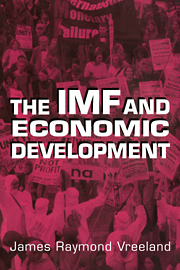Book contents
- Frontmatter
- Contents
- List of Tables and Figures
- Acknowledgements
- 1 Introduction
- 2 Analytically Significant Cases
- 3 An Analytical Approach to the Politics of IMF Agreements
- 4 Testing the Selection Story
- 5 The Effect of IMF Programs on Economic Growth
- 6 Distributional Consequences of IMF Programs
- 7 Conclusions
- Appendix 1 Variables Used in This Study
- Appendix 2 Country-Years in Samples
- References
- Index
7 - Conclusions
Published online by Cambridge University Press: 08 January 2010
- Frontmatter
- Contents
- List of Tables and Figures
- Acknowledgements
- 1 Introduction
- 2 Analytically Significant Cases
- 3 An Analytical Approach to the Politics of IMF Agreements
- 4 Testing the Selection Story
- 5 The Effect of IMF Programs on Economic Growth
- 6 Distributional Consequences of IMF Programs
- 7 Conclusions
- Appendix 1 Variables Used in This Study
- Appendix 2 Country-Years in Samples
- References
- Index
Summary
The main findings of this book are that governments enter into IMF programs not just for economic reasons but for political reasons as well, and that these programs hurt economic growth and exacerbate income inequality. Hence, this study paints the following picture of participation in IMF programs: Governments enter into IMF programs under bad economic circumstances. Their choice is not usually between good and bad economic performance but between bad performance on their own – without the IMF – or worse performance under a program sponsored by the IMF. Why would governments agree to programs that hurt economic growth? By bringing in the IMF, governments gain political leverage – via conditionality – to help push through unpopular policies. For some constituencies, these policies dampen the effects of bad economic performance by redistributing income upward and thus rewarding elites. If the distributional consequences are strong enough, key groups can be made better off even though growth is hurt. But IMF programs hurt doubly the least well-off in society: Total output growth islowered, and income is shifted away from them.
The results of this study raise new questions and have important policy implications. Thus, after reviewing my central findings, this chapter lays out new avenues of research and concludes with some suggestions for reform of the IMF.
SELECTION FINDINGS – WHY GOVERNMENTS AND THE IMF ENTER INTO AGREEMENTS
The central question of this study has been an empirical one: What is the effect of IMF programs on economic growth?
- Type
- Chapter
- Information
- The IMF and Economic Development , pp. 152 - 165Publisher: Cambridge University PressPrint publication year: 2003



